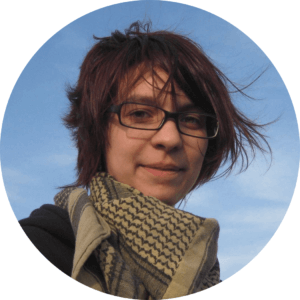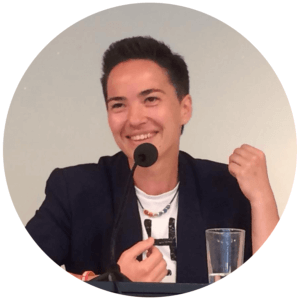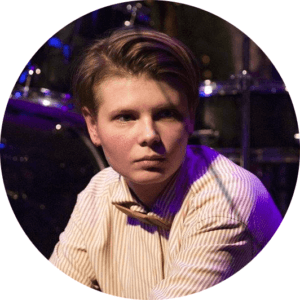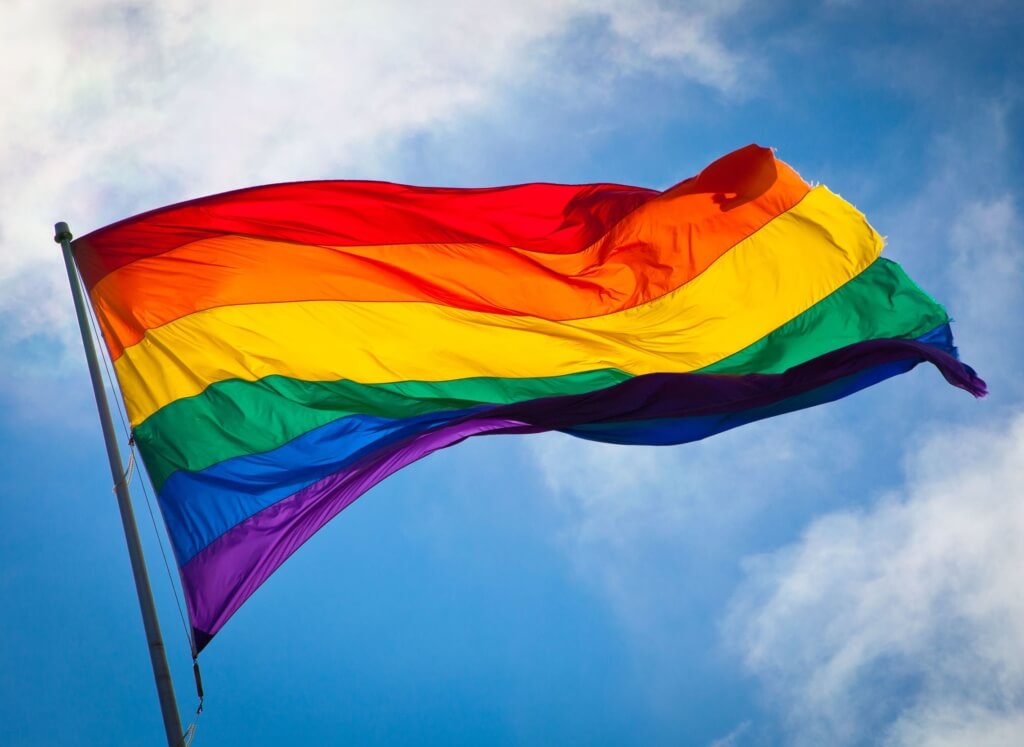Halyna Herasym, MA student of political science at San Diego State University, Lviv native
I see nothing, I hear nothing, I know nothing
The story of the response to the disrupted Equality Festival in Lviv is a story of a city which made a very typical logical error.
The attempt to hold the Equality Festival in Lviv sparked heated debate and confrontation. The opponents of the festival made all kinds of arguments: they said that it was inappropriate when war is ongoing within the country; that it would offend the feelings of religious people, since the event would coincide with the beginning of Lent. In conservative Galicia, the reminder that minority rights must also be respected was interpreted as a provocation, and quick analysts as well as the conspiracy theorists immediately saw the omnipresent “hand of Moscow” on all sides of the scandal.
In fact, this case is related to another significant violation which happened a couple of years ago. In March, 2012, Oksana Makar, who was raped and then tortured, died in hospital. Even though this case led to serious protests demanding the punishment of those responsible for the crime, accusations along the lines of “nothing would have happened if she did not have the habit of going out with male strangers” poured upon Oksana from all directions.
What is similar about these two seemingly completely different cases?
Half a century ago, the social psychologist Melvin J. Lerner held a series of experiments, the results of which described a cognitive bias which Lerner later called the “just world hypothesis”. In general, the scientist claimed, people are so inclined to believe that others get what they deserve that they often subordinate their lives to this belief, even if it sometimes goes against their own interests. The bias can often be observed in situations where something bad happens to people, such as persecution, rape, or even illness. Researchers of the just world fallacy claim that the belief can even have beneficial effects on a person’s psychological condition, since it creates the illusion that the world is not chaotic, and you have control over your own life.
Every day, people encounter a lot of injustice. It is unjust that, say, after the overthrow of an authoritarian regime, a foreign country managed to seize a piece of land. It is unjust that peaceful protesters trying to exercise their right to peaceful assembly and freedom of speech are attacked by aggressive members of radical organizations. The result is that people have to deal with their own bias and reconcile it with reality.
The reconciliation can be carried out in many ways. For example, you can try to fix the injustice. Or you can look for the reasons behind what happened in the victim’s behaviour. Such reasons can always be found post factum, since the great majority of people do not spend their time sitting in closed bunkers where neither attackers nor viruses can reach them. Blaming the victim, however, as in the case of Oksana Makar, is usually completely absurd: any kind of pastime with strangers or “immoral behavior” are no reason to commit murder. And quitting all behaviours that might “seduce” or “provoke” a criminal means living in a bunker, as described above.
Taking into account the extent to which Ukrainian society is used to deceptions about a “fascist state” and “criminal junta,” there is a significant temptation to assume that there is no radical right in Ukraine, and that the youths that perform Nazi salutes and attack other citizens are innocent patriots with Yarosh’s business cards, who are simply reacting to provocation. Given that the stereotypical radical right that crucifies young boys, as well as the fascist junta, apparently doesn’t exist in Ukraine, it looks like there has been a misunderstanding, and a natural desire emerges to conclude that those who were attacked are to be blamed for it.
The position of openly homophobic right-wing radical organizations regarding the Equality Festival is outrageous, but not surprising. However, the response from that part of society that presents itself as tolerant and LGBT-friendly, the response by some analysts and intellectuals is, at the very least, confusing. The public, who are much more progressive than the young men from Misanthropic Division, Sokil and other similar organizations, naturally condemned the violence. However, they also unfortunately demonstrated almost the same set of biases as more conservative citizens and organizations, such as the official representatives of the Ukrainian Greek Catholic Church.
Both local and national media contained accusations by writers, editors, journalists, and professors, addressed to the Festival’s organizers. For example, they were accused of insufficient explanation as to what the event would be about; of ruining the fragile social consensus for the sake of “adrenalin;” of not waiting until the negotiations about the visa-free border crossing regime began. Opinion makers also repeated the city government’s mantra that “it seems that it’s a well-planned Russian information attack.”
The attempt to equate an event filled with discussions, literature readings, film screenings and an urban quest with the gathering of people who threw stones through windows and cars looks bizarre and illogical, if not plainly grotesque. I don’t want to accuse the respectable public, who express similar opinions, of homophobia or of consciously turning a blind eye to discrimination, so I must assume that it is simply a misunderstanding and a destructive implementation of their belief in the just world.
Such equivalencies move the discussion from the field of law, whose purpose is to moderate the way various social groups exercise their rights, to the field of moral judgement, which are relative, unstable and hard to regulate. There is nothing harmful about discussions of morality, but comparing explicitly illegal and violent actions to legal and non-violent ones undermines the universality of law. If the law is not mandatory for certain groups because they have moral justification, then how can we speak of any kind of constitutional state?
Overwhelmed by the illusion of a just world, the public, who equate the two sides of the conflict, are in fact supporting those who promote closed-mindedness, xenophobia, and discrimination, along with those who ignore the law.
Regardless of their views on homosexuality, it seems that it is time for the progressive public to choose which side they are on.
Olena Shevchenko, civic activist, head of Insight LGBT NGO
Along with two other people (one of the organizers and Maria Katseva), I arrived in Lviv at about twelve o’clock. The trip went awry for us from the very beginning: while we were on the train, we received a call from the Lviv Hotel, where we were supposed to stay during the festival, and were denied our booking of 25 beds and the conference hall where we were going to hold one of the Equality Festival events. They referred to a warning from Lviv City Hall about us. After we got off the train, we went to the hotel to clarify the situation. They denied any connection to the city council, and instead claimed that the police were involved in the cancellation. The conversation was very unpleasant: both the owner and the administration behaved and spoke in a very rude and homophobic manner, and they made it clear that they had refused to provide us rooms specifically because of our sexual orientation. You can listen to a recording of that conversation with the employees of Lviv hotel online.
After we left the hotel, we started to look for other accommodation. Meanwhile, I received a call from Halytsky court and was informed that, in an hour, there would be a court hearing about a lawsuit against our organization, Insight, regarding the prohibition of public events. I believe that it is completely abnormal to be notified about a court hearing an hour before it starts. Going by the experience I had in Kyiv, it’s a sign that the decision had been made in advance (in this case, the decision to prevent the Equality Festival from happening). I would also note that, before the festival attracted so much attention, there was no need to register such an event with the city council, according to the law. But after the scandal got stirred up, our planned quest around the city (which is basically the same thing as a flash mob) meant we were forced to register the event as some kind of demonstration or protest.
I was in the courtroom from 6 p.m. until midnight. When we arrived, the police were already there as the plaintiff, and there was a representative of the executive body of the city council, the guards and another defendant stood toward the side. Before the hearing, the representatives of the ‘new’ police greeted the members of right-wing organizations who were present. It turned out that it was the police who requested that City Hall prohibit public events on the weekend of March 19-20. The judge asked the police officers if they were incapable of doing their job, but they, obviously, avoided direct answers. They answered that they would carry out their duties in order to protect public order. But, at the same time, they filed a request to prohibit the event, claiming that they would not have been able to maintain order. I think there is a substantial contradiction here in their accusation and their arguments. The city council collaborated with the police; it was visible in the courtroom. In addition, the police conveyed all the information about what was happening to right-wing radicals. Who was responsible, the new or the old police, is a good question. I do not know. But it was obvious that they were interested in preventing the festival.
The situation in the courtroom was quite tense. On behalf of the other defendant, there were representatives of a couple of organizations who put in requests for an event on the same day and at the same time as ours. These organizations were Sokil (Falcon), Bili Horvaty (White Horvats), the Union of Anti-Terrorist Operation veterans, and five other organizations. The longer we sat there, the more people gathered at the courtroom door. There were around forty of them. The ones that were sitting in the courtroom took the liberty of making rude homophobic remarks and engaging in mockery. As for the judge, my personal impression is that he was a homophobe. But, from a professional point of view, I have no complaints about him. He was acting in accordance with the law. He did what he had to do, and allowed me to speak and to comment.
Around midnight, the situation became especially tense and unreasonable, and seemed quite dangerous to me. Nobody responded to the calls for help we addressed to the citizens of Lviv, which were spread around social media. We failed to find private guards in Lviv. We were rejected on every phone number we called, based on the claim that the guards could not stand up to Svoboda. We were completely alone in the city. However, eventually, two journalists from the 24 Channel turned up, the same people who, after we shared the information about the incident in Lviv Hotel on Facebook, had come to ask the hotel employees for comment after we left. Thanks to them, the situation in the courtroom eased up: the presence of the media cooled down the young men from the right-wing organizations.
After midnight, the judge ended the hearing, asked everybody to leave the room and said that the decision would be announced in a couple of hours. I think it was his way of distracting the guys who were obviously aggressively disposed against us, so that we could leave the building safely. We can thank him for that.
In the morning, we received the court’s decision to prohibit street events on March 19-20, but we decided that the Equality Festival would take place nevertheless. In fact, before the Festival was disrupted, we managed to hold most of the planned events: the press conference, the exhibition opening, the film screening, the discussion between LGBT parents. People who wanted to disrupt the event started gathering in front of the door at noon. We personally hired five security guards from Kyiv. The police failed to arrive after numerous calls. We started to make phone calls to Kyiv, trying to reach the leadership of the national police. After four hours, a special division of police arrived at Dnister Hotel.
The head of the police headquarters in Lviv Region, Zaharia Dmytro, arrived at the location personally with reinforcements. That is to say, they decided to act only after they received a call from Kyiv (that is, from Khatia Dekanoidze — ed.), it was obvious. At the same time, they received an anonymous call notifying about a supposed bomb threat at the hotel. Of course, it was a false alarm, but the evacuation started. I decided to end the festival at this point, because someone had already begun to break through the door, and two people somehow reached the second floor. Zahariya and I started to plan the evacuation. I must note that he behaved in a rude and homophobic manner, accused us of intentional provocation a couple of times, and of carrying out the festival despite the court prohibition. When I pointed out that, outside the building, there was a public gathering of extremists, he replied that those people came to visit their friends. The evacuation was carried out very unprofessionally. They ordered that all the people who did not live in the Dnister Hotel be driven away in a police van. I was supposed to be among those people. Those who were spending a night at the hotel were ordered to go back to their rooms and lock the doors. I think there were gaps in providing security to all participants. The evacuation plan was not exactly operating on a high level. We exited through the main entrance. I think they did it to show me for a moment to the extremists who had gathered outside the hotel and, that way, to demonstrate that I was not in the building any longer and that I was being taken away. In the bus, there were people I didn’t know, who had come to attend the festival, Maria Katseva and I, and the LGBT parents. However, Zaharia’s deputy Mykola Samarchuk worked efficiently, and I must also acknowledge the work of the Berkut[1] officers who evacuated us. They were the only ones who did everything well throughout this situation. I do not have any especially negative or positive attitudes regarding Berkut, but they managed this particular situation well. Up until that point, the right-wing radicals had just kept watch, but when the evacuation started, they set out to attack the bus. They blocked it at the exit. The bus was shaking in all directions, and a couple of windows were smashed.
We were taken to a Berkut base, and once there we were left to wait around. Afterwards, we were simply let go and told to walk in different directions in couples, and to head to the shopping mall. Just like that.
Why do I say that the police collaborated with the right-wing radicals? When we had already left Dnister, I received a call from a journalist who stayed there telling me what she had overheard. One of the police chiefs was soothing the right-wing radicals, assuring them that they would be told where we had been taken and where we would be sent afterwards.
And then everything felt like we were in a movie. We left without our stuff, without anything, we had left everything in the hotel. Maria didn’t even have her jacket. If not for the stranger who was on the bus with us, and who was the only one who offered to let us stay at her place close to Lviv for a while, I don’t know what we would have done. We went down some side streets, trying to avoid running into the right-wingers who had announced a hunt for LGBT people that weekend. At that girl’s apartment, we decided that I had to leave Lviv. She offered to go to some friends of hers, a heterosexual couple who lived in Stryy. And, by minibuses and trains, we managed to reach them. When I was already on the bus, I wrote on my Facebook page that I had left the city. I hoped to pacify the right-wingers with that, because it was mostly they who followed me. In Stryy, we were received by good people. We sat at their table, drank tea and talked, and everything felt surreal. Later that night, we left for Kyiv.
I received a lot of personal threats. I have more than a hundred threatening unread messages on Facebook. Most of these are accusations of perversion, immoral behavior, and provocations. They threaten to find me wherever I am and exact their revenge, because a lesbian is not a woman, but the same as a “faggot.”
It is nothing compared to the fact that nobody will likely be punished for their violations of basic human rights. But we will not just leave it at that. I think that everything happening now, the distortion of information by the Lviv City Council and the Mayor Sadovy, who say that enemies of Lviv provoked the conflict to damage the city’s reputation, is absurd. And, in this case, we have nothing left to do but to provide a true account in return. For example, we are going to sue the Lviv City Council, and they will be accused of inaction, at the very least. The LGBT community must continue fighting for their rights.
 Anna Vynnychenko, a member of the band SPLASH
Anna Vynnychenko, a member of the band SPLASH
The band and I arrived on Saturday. We were supposed to perform on Sunday night. When we were on the train, we were already following what was happening in Lviv. From time to time, we were contacted by the organizers and notified about the course of events. We were supposed to check into the hotel at 2 p.m., so we were in the city by that time, waiting for the trouble to be over. Then, around 2 p.m., we hired a taxi and went to the Dnister Hotel. As we got closer, we saw a huge number of people gathered outside the building. It was impossible to drive close to the hotel or even to enter the building: the entrance was blocked. It was even scary to leave the car. One girl asked the taxi driver to lock the doors. The guys were coming up to us with comments: “So you came to see the faggots?” The police, I saw, were friendly with these people in tracksuits, sneakers, and balaclavas. I went out to at least find out what was going on, but I didn’t get too close because I was dressed in bright clothes, and I was afraid that I would provoke someone to get aggressive about my appearance. I also noticed that the right-wing radicals stayed in groups and took turns: one group went away from the hotel, while the other came to substitute for them. As they changed the guard, they saluted each other and amused themselves with homophobic jokes. At that moment, we heard about the so-called ‘bomb threat’ at the hotel, and decided to leave. In Lviv, we saw how dangerous the situation was, it was very scary. There were similar-looking, identically-dressed people everywhere, they were looking out for people who were different in some way. That’s why the whole band decided to leave the city that very same day. From now on, I will attend every possible Equality March.
Endnotes:
[1] The Berkut unit was disbanded. However, the comment’s author heard that the special forces were referred to as Berkut by their own colleagues. The police officers probably chose to refer to the unit by the name they were used to. — Ed.
This article originally appeared on Political Critique’s Ukrainian edition. Translated by Roksolana Mashkova.
![Political Critique [DISCONTINUED]](https://politicalcritique.org/wp-content/uploads/2015/09/Political-Critique-LOGO.png)
![Political Critique [DISCONTINUED]](https://politicalcritique.org/wp-content/uploads/2015/09/Political-Critique-LOGO-2.png)
